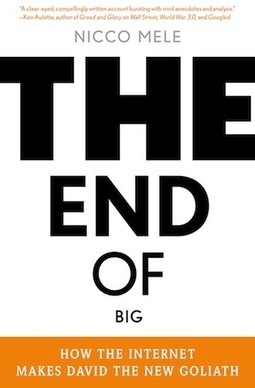"What if news organizations confronted the reality that nearly all media will be 'social media' a decade hence?

|
Scooped by
Robin Good
April 13, 2013 11:30 AM
|
If you are wondering what the future of news may really look like, my advice is to give a very good read to this fantastic article.
In it, Nicco Mele and John Wihbey report the sad state of the news industry and illustrate the facts that indicate an alternative, high-value path that can be taken for the future. The tracks are already there, paved by some pioneering orgs and by a bunch of small individual personalities on the web.
This article distills the very own business and development approach I have been using since 2008, when I have decided to move away from depending on Google-based advertising revenues and toward the creation of a service dedicated specifically to develop information-based micro-businesses focusing on individual personalities.
Here, from a ton of interesting content I have excerpted 10 key thoughts that stand out for me as being fully representative of the new model that is emerging for the future of the news business (curators, subject-mater experts, individual with a real expertise read closely).
1) ...terrifying signs of the decline of the news industry.
...three of America’s most esteemed papers for sale — The Boston Globe, the Chicago Tribune, and the Los Angeles Times...
2) News revenue remains overwhelmingly dependent upon advertising, but the radical connectivity of the Internet has greatly diminished both the scale of newspapers’ reach as well as the value of advertising.
3) What if journalists became like your doctor, dentist, or teacher — people who provide a valuable service to you, and whose name, voice, and personality are more intimate? ...The question then becomes how to create a social presentation layer that wraps around news — preserving the integrity of the product but updating its interface to fit with human behavior in the digital age.
4) Without an identity, much journalistic content will increasingly be swept around the Internet in an anonymous blur of sharing and finding through networks, with little regard for the source or the labors taken to produce that news.
5) ...re-design the newspaper to be a platform for talent across multiple media. ......what if news outlets decided to flip their model, so that the editorial staff was not subservient to the brand, but the “brand” became a platform for talent?
6) ...outlets, like Boing Boing, are making money largely based on the brands of several smart, interesting personalities. Many of the “blogging networks” are built around aggregating traffic across different online personalities. One could name dozens of examples where a single blogger or news personality is driving substantial traffic. ...we’re already likely to see a “new dance between top talent and media brands,”... “If brands are successful at assembling enough talent,” ... “they’ll succeed because they provide easy entry points for us consumers.”
7) The future of news organizations is a lot of [diversfied] revenue sources — maybe as many as 30 or 40 — and none of them account for a substantial stake of the organization’s income.
8) In March of 2008, Kevin Kelly famously put forth the theory of 1,000 true fans as a potential future for music. Find 1,000 dedicated enthusiasts willing to pay you $100 a year for your music, and then you don’t have to worry about selling albums.
9) Why are more journalists not doing the same — and creating more kinds of editorial products to sell — while cultivating a paying fan base?
With the decline of trust and loyalty in large institutions, it is increasingly hard to imagine people in the coming decades subscribing because of loyalty to an institutional Big Media entity. Yet it’s easy to imagine them wanting to fund several people whom they trust to bring them information they care about.
10) ...research to date shows that the average news consumer is a creature of habit, circling back to the same two to four big websites to get their news. But this will not continue in perpetuity... “Elite” news consumers — ... already organize their consumption this way, around key Twitter and RSS feeds, following lists of personalities they like or admire. The broader public will ultimately begin to shift in this direction.
Milestone. Must-read article. Insightful. Inspiring. Well-documented. 10/10
Full article: http://www.niemanlab.org/2013/04/the-end-of-big-media-when-news-orgs-move-from-brands-to-platforms-for-talent/



 Your new post is loading...
Your new post is loading...








Well, you can start thinking about it... what is coming out of this for you... personally and company-wise...
this space is fair fizzing, and the pace of change and creative destruction is - if anything - continuing to accelerate ...